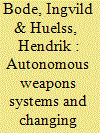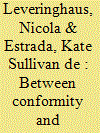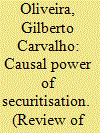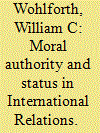|
|
|
Sort Order |
|
|
|
Items / Page
|
|
|
|
|
|
|
| Srl | Item |
| 1 |
ID:
160117


|
|
|
|
|
| Summary/Abstract |
Autonomous weapons systems (AWS) are emerging as key technologies of future warfare. So far, academic debate concentrates on the legal-ethical implications of AWS but these do not capture how AWS may shape norms through defining diverging standards of appropriateness in practice. In discussing AWS, the article formulates two critiques on constructivist models of norm emergence: first, constructivist approaches privilege the deliberative over the practical emergence of norms; and second, they overemphasise fundamental norms rather than also accounting for procedural norms, which we introduce in this article. Elaborating on these critiques allows us to respond to a significant gap in research: we examine how standards of procedural appropriateness emerging in the development and usage of AWS often contradict fundamental norms and public legitimacy expectations. Normative content may therefore be shaped procedurally, challenging conventional understandings of how norms are constructed and considered as relevant in International Relations. In this, we outline the contours of a research programme on the relationship of norms and AWS, arguing that AWS can have fundamental normative consequences by setting novel standards of appropriate action in international security policy.
|
|
|
|
|
|
|
|
|
|
|
|
|
|
|
|
| 2 |
ID:
160121


|
|
|
|
|
| Summary/Abstract |
China and India, as rising powers, have been proactive in seeking status as nuclear responsibles. Since the 1990s they have sought to demonstrate conformity with intersubjectively accepted understandings of nuclear responsibility within the global nuclear order, and have also sought recognition on the basis of particularistic practices of nuclear restraint. This article addresses two puzzles. First, nuclear restraint is at the centre of the pursuit of global nuclear order, so why have China and India not received recognition from influential members of the nuclear order for the full spectrum of their restraint-based behaviours? Second, why do China and India nonetheless persist with these behaviours? We argue that the conferral of status as a nuclear responsible is a politicised process shaped by the interests, values, and perceptions of powerful stakeholder states in the global nuclear order. China’s and India’s innovations are not incorporated into the currently accepted set of responsible nuclear behaviours because, indirectly, they pose a strategic, political, and social challenge to these states. However, China’s and India’s innovations are significant as an insight into their identity-projection and preferred social roles as distinctive rising powers, and as a means of introducing new, if nascent, ideas into non-proliferation practice and governance.
|
|
|
|
|
|
|
|
|
|
|
|
|
|
|
|
| 3 |
ID:
160122


|
|
|
|
|
| Summary/Abstract |
This article joins the nascent debate on the causal status of securitisation theory. Relying on critical realist’s efforts to deepen and broaden the concept of cause – defined as ‘causal complex’ – and its insights to integrate discourse and constitutive relations into a non-positivist framework for causal explanation, the article aims to explore the explanatory status of securitisation theory, without downgrading its discursive core. To illustrate this argument, the article uses the securitisation of Somali piracy as an example of how the causal analysis of securitisation can contribute to explain some of the dynamics involved in security governance. From this perspective, securitisation works within a broader empirical framework of security, significantly implicated in causal relations, going beyond the Copenhagen School’s conception of securitisation as a non-causal constitutive theory merely defined as a formal framework for analysis. The article discusses, finally, the relevance and implications of introducing causal analysis in the study of securitisation.
|
|
|
|
|
|
|
|
|
|
|
|
|
|
|
|
| 4 |
ID:
160124


|
|
|
|
|
| Summary/Abstract |
International politics has often been viewed as a brutal place where might trumps right and where, as a consequence, questions of democracy are irrelevant to ask. In the last decades, however, scholars and political leaders have increasingly suggested that elements of democracy exist in governance beyond individual states. If this is so, how does democracy beyond the state shape international politics? This article suggests conceptual preliminaries for theorising consequences of democracy beyond the state in general and their implications for problems of peace and conflict in particular. The purpose is twofold: first, to begin reconstructing existing normative democratic theory into an explanatory perspective sensitive to international politics; second, to indicate how this new perspective is able to explain empirical observations pertaining to conflict and cooperation among states; international institutions; foreign policies; human rights protection; and the violence of transnational terrorist networks.
|
|
|
|
|
|
|
|
|
|
|
|
|
|
|
|
| 5 |
ID:
160119


|
|
|
|
|
| Summary/Abstract |
In recent years there has been a ‘turn’ to thinking about war through the experiences of those touched by it. While this scholarship has generated numerous important insights, its focus has tended to remain on wars’ violences, those responsible for enacting them, and the effects of such violence. In this article, the experiences of pleasure and joy in war that simultaneously take place are placed centre stage. Drawing on three war novels, the article tracks three recurring themes of pleasurable and joyful experiences related to war: bodily pleasures, the ‘togetherness’ of war, and moments of joy that escape war’s reach. Through this focus, war is shown to work across a range of affective registers and as never totalising or universalising in its experience. The article argues that paying attention to joy and pleasure can work to displace war as a focus of analysis, directing attention instead to the experiences of those who live through war and how they survive, sustain, and resist it.
|
|
|
|
|
|
|
|
|
|
|
|
|
|
|
|
| 6 |
ID:
160123


|
|
|
|
|
| Summary/Abstract |
We develop scholarship on status in international politics by focusing on the social dimension of small and middle power status politics. This vantage opens a new window on the widely-discussed strategies social actors may use to maintain and enhance their status, showing how social creativity, mobility, and competition can all be system-supporting under some conditions. We extract lessons for other thorny issues in status research, notably questions concerning when, if ever, status is a good in itself; whether it must be a positional good; and how states measure it.
|
|
|
|
|
|
|
|
|
|
|
|
|
|
|
|
| 7 |
ID:
160120


|
|
|
|
|
| Summary/Abstract |
As Donald Trump’s presidential campaign showed, walls are a hot topic. While ‘globalisation’, with its free flow of capital and goods, characterised world politics after the end of the Cold War, the twenty-first century has witnessed a reassertion of cultural, legal, and physical barriers. It is common to criticise such post-Cold War walls, especially the US-Mexico Barrier and Israel’s West Bank Barrier, as ineffective and immoral. This article problematises such critical discourse by using unlikely juxtapositions (the Great Wall of China) and new conceptual frameworks (gaps, critical aesthetics) to explore: (1) how walls can be a rational security policy; (2) how they are not simply barriers, but can be complex sites of flows; and (3) how walls are not simply texts waiting to be decoded: they are also sites of non-narrative affective experience that can even excite the sublime. This critical juxtaposition of walls first explores what they can tell us about the politics of borders, identity, and foreign policy, and then considers how walls, as concrete visual artefacts, can be examples not simply of ideology, but also of affect. The article aims to understand walls in a different register as active embodiments of political debate – and of political resistance.
|
|
|
|
|
|
|
|
|
|
|
|
|
|
|
|
| 8 |
ID:
160125


|
|
|
|
|
| Summary/Abstract |
This study examines the effects of contestation on individual norms that are embedded in larger norm clusters. We define norm clusters as collections of aligned, but distinct norms or principles at the center of a regime. Norm clusters include multiple norms that can be insulated from contestatory challenges by degrees of cohesion, institutionalisation, and legalisation. While some constructivists argue that the most important dynamic to study is ‘robustness’ of individual norms, we contend that ‘resiliency’ of norm clusters offers a richer assessment of prospects for international cooperation and long-term impact on state behaviours. Thus, this study distinguishes conceptually between different structural layers that can generate various effects in conjunction with norm contestation. We add a third, or intervening layer of explanation with norm clusters, between the intersection of norms (lowest layer) and normative structures (broadest layer). To explore this argument, comparative case studies examine the resiliency of two prohibitionary norms – the nuclear disarmament norm within the non-proliferation regime and the norm banning assassination of foreign adversaries, which is not embedded in a regime structure. While the robustness of individual norms may be challenged, our results suggest a role for resilient structures in promoting overall longevity of norm clusters.
|
|
|
|
|
|
|
|
|
|
|
|
|
|
|
|
| 9 |
ID:
160118


|
|
|
|
|
| Summary/Abstract |
In recent years, satellite imagery, previously restricted to the defence and intelligence communities, has been made available to a range of non-state actors as well. Non-governmental organisations, journalists, and celebrities such as George Clooney now use remote sensing data like digital Sherlock Holmeses to investigate and reveal human rights abuses, political violence, environmental destruction, and eco-crimes from a distance. It is often said that the increasing availability and applicability of remote sensing technologies has contributed to the rise of what can be called ‘satellite-based activism’ empowering non-state groups to challenge state practices of seeing and showing. In this article we argue that NGO activism is not challenging the sovereign gaze of the state but, on the contrary, actually reinforcing it. We will bolster our arguments in this regard in two prominent fields of non-governmental remote sensing: human rights and environmental governance.
|
|
|
|
|
|
|
|
|
|
|
|
|
|
|
|
|
|
|
|
|